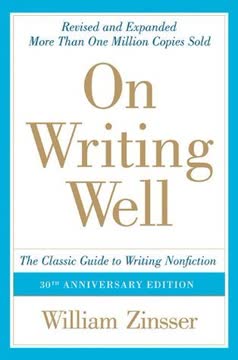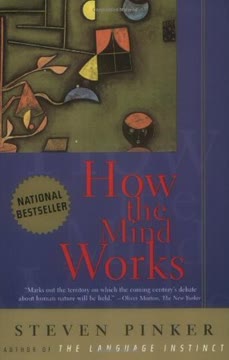Key Takeaways
1. Good writing starts with classic style: Clear, direct, and engaging
Good writing can flip the way the world is perceived, like the silhouette in psychology textbooks which oscillates between a goblet and two faces.
Classic style enlightens. It treats writing as a window onto the world, where the writer guides the reader's gaze to something previously unnoticed. This approach assumes that the writer has already grasped the truth and is simply presenting it clearly. The reader is seen as an equal, capable of understanding if given an unobstructed view.
Characteristics of classic style:
- Presents ideas as if showing objects in the world
- Engages the reader in conversation
- Uses concrete language and vivid imagery
- Avoids meta-discourse and excessive signposting
- Focuses on the subject matter, not the process of writing
Classic style contrasts with other approaches like self-conscious, relativistic, or postmodern styles that constantly question their own enterprise. By adopting classic style, writers can overcome many common pitfalls of bad writing, such as verbosity, abstraction, and confusion.
2. Overcome the curse of knowledge to communicate effectively
The curse of knowledge is the single best explanation I know of why good people write bad prose.
Empathy is crucial. The curse of knowledge refers to the difficulty in imagining what it's like for someone else not to know something you know. This cognitive bias leads writers to assume their readers have background knowledge they don't actually possess, resulting in unclear and inaccessible writing.
Strategies to overcome the curse:
- Show drafts to people similar to your intended audience
- Use concrete examples and analogies
- Explain technical terms and concepts
- Provide context and background information
- Use "for example," "such as," and other clarifying phrases
Remember that your readers don't share your expertise or thought process. By actively working to bridge this gap, you can make your writing more understandable and engaging for a wider audience.
3. Master syntax to construct clear and coherent sentences
Syntax, then, is an app that uses a tree of phrases to translate a web of thoughts into a string of words.
Sentence structure matters. Understanding syntax—how words and phrases fit together to form sentences—is crucial for clear writing. By visualizing sentences as tree structures, writers can avoid common pitfalls like dangling modifiers, misplaced phrases, and ambiguous references.
Key syntactic principles:
- Maintain subject-verb agreement, even in complex sentences
- Place modifiers close to the words they modify
- Use parallel structure for items in a series
- Be mindful of the order of phrases and clauses
- Employ active voice for clarity, using passive voice strategically
By mastering these principles, writers can craft sentences that accurately convey their intended meaning and are easy for readers to parse and understand.
4. Build coherence through logical flow and consistent themes
Coherence depends on more than mechanical decisions such as keeping the topic in subject position and choosing appropriate connectives.
Guide your reader. Coherence is the quality that makes a text flow logically and read smoothly. It goes beyond individual sentences to encompass how ideas are connected and developed throughout a piece of writing.
Elements of coherent writing:
- Use topic sentences to introduce main ideas
- Employ transition words and phrases to link thoughts
- Maintain consistent themes and terminology
- Organize information in a logical sequence
- Provide context and background for new ideas
Remember that coherence is about creating a clear path for your reader to follow. By carefully structuring your writing and maintaining consistent threads of thought, you can ensure that your ideas are easily understood and remembered.
5. Navigate the complexities of grammar with discernment
Many prescriptive rules originated for screwball reasons, impede clear and graceful prose, and have been flouted by the best writers for centuries.
Question rigid rules. While grammar is important, it's crucial to distinguish between genuine rules that enhance clarity and mere superstitions that hinder effective communication. Many commonly taught grammar rules are based on misconceptions or arbitrary preferences.
Approach to grammar:
- Understand the reasoning behind grammar rules
- Distinguish between formal and informal contexts
- Be aware of how language evolves over time
- Prioritize clarity and effective communication over rigid adherence to rules
- Learn from reputable sources and usage guides
By developing a nuanced understanding of grammar, writers can make informed choices that enhance their writing rather than being constrained by unnecessary restrictions.
6. Use punctuation to enhance clarity and readability
The main job of punctuation is to eliminate the ambiguities and garden paths that would mislead a reader if print consisted only of vowels, consonants, and spaces.
Punctuate purposefully. Proper punctuation is not just about following rules; it's about guiding the reader through your text. Good punctuation can prevent misunderstandings, control pacing, and emphasize important points.
Key punctuation principles:
- Use commas to separate elements and avoid ambiguity
- Employ semicolons to join related independent clauses
- Utilize colons to introduce lists or explanations
- Apply dashes for emphasis or to set off parenthetical information
- Use quotation marks accurately for dialogue and citations
Remember that punctuation serves the reader. When in doubt, consider how your punctuation choices affect the clarity and flow of your writing.
7. Embrace the evolution of language while maintaining standards
Linguistic bubbe meises arise from a number of sources. Some of them originated in the first English writing guides published in the seventeenth and eighteenth centuries, and have been handed down in an oral tradition ever since.
Balance tradition and change. Language is constantly evolving, and good writers must navigate between respecting established norms and embracing useful innovations. Many common usage beliefs are actually myths or outdated rules that no longer serve a purpose.
Approach to language change:
- Be skeptical of absolute rules without clear rationales
- Consult modern usage guides and dictionaries
- Consider the needs of your audience and context
- Embrace clarity and effectiveness over rigid traditionalism
- Be open to new words and constructions that fill genuine needs
By understanding the history of usage rules and the principles of language change, writers can make informed decisions that balance tradition with innovation, resulting in more effective and contemporary communication.
Last updated:
FAQ
What's The Sense of Style about?
- Modern Writing Guide: The Sense of Style by Steven Pinker is a contemporary guide that combines insights from linguistics, cognitive science, and style to improve writing.
- Critique of Traditional Manuals: Pinker critiques outdated style manuals, advocating for a modern approach that reflects the evolving nature of language.
- Focus on Clarity and Coherence: The book emphasizes engaging the reader's mind and conveying ideas effectively through clarity and coherence.
Why should I read The Sense of Style?
- Improve Writing Skills: The book offers practical tips to enhance writing skills across various contexts, from academic to creative writing.
- Engaging and Accessible: Pinker’s use of humor and relatable examples makes complex linguistic concepts easy to understand.
- Evidence-Based Approach: Grounded in scientific research, the book provides a solid foundation for understanding effective writing principles.
What are the key takeaways of The Sense of Style?
- Embrace Clarity and Simplicity: Pinker advises writers to focus on straightforward communication by omitting needless words.
- Understand Syntax and Structure: Understanding syntax helps avoid ungrammatical and convoluted prose.
- Recognize the Curse of Knowledge: Awareness of this cognitive bias helps writers communicate more effectively with their audience.
What is the "Curse of Knowledge" in The Sense of Style?
- Definition of the Curse: It refers to the difficulty in imagining what it’s like for someone else not to know something you know.
- Impact on Writing: This bias can lead to opaque prose, as writers may skip explanations that are obvious to them but not to readers.
- Overcoming the Curse: Pinker suggests being mindful of the audience's knowledge and providing necessary context and explanations.
How does Steven Pinker critique traditional style manuals in The Sense of Style?
- Lack of Grammatical Accuracy: Pinker highlights misdefinitions and inaccuracies in traditional manuals like Strunk and White’s.
- Outdated Advice: He argues that much advice is outdated and doesn’t reflect current language understanding.
- Need for a Modern Approach: Pinker advocates for incorporating insights from linguistics and cognitive science into writing guides.
What writing techniques does Steven Pinker recommend in The Sense of Style?
- Focus on Good Prose: Pinker encourages reverse-engineering well-crafted sentences to develop a "writerly ear."
- Use of Classic Style: He promotes presenting ideas clearly and simply, focusing on the reader's understanding.
- Avoiding Unnecessary Complexity: Pinker advises against convoluted sentence structures and unnecessary jargon.
What are some common writing pitfalls discussed in The Sense of Style?
- Jargon and Technical Language: Overuse of jargon can alienate readers; clear, everyday language is recommended.
- Ambiguous Syntax: Ambiguous syntax can confuse readers and obscure meaning, leading them down "garden paths."
- Lack of Coherence: Ensuring logical connections between sentences is crucial for maintaining coherence in writing.
How does Steven Pinker define good writing in The Sense of Style?
- Clarity and Grace: Good writing is clear and graceful, allowing readers to easily grasp the intended message.
- Engagement with the Reader: Writing should feel like a conversation, engaging the reader rather than lecturing.
- Attention to Detail: Careful attention to grammar and style enhances the overall quality of writing.
What specific advice does Steven Pinker give about grammar in The Sense of Style?
- Use of Singular "They": Pinker supports its use as a gender-neutral pronoun, citing historical precedent and modern acceptance.
- Avoiding Split Infinitives: He argues that split infinitives can enhance clarity and should be used when appropriate.
- Understanding Tense and Mood: Correct use of tense and mood is crucial, especially in conditional statements and indirect discourse.
What does Steven Pinker say about coherence in writing?
- Logical Flow: Coherence is achieved through a logical flow of ideas, with each sentence building on the previous one.
- Use of Connectives: Coherence connectives signal relationships between ideas, aiding reader comprehension.
- Thematic Consistency: Maintaining thematic consistency ensures all parts contribute to the central argument or narrative.
How does Steven Pinker address the issue of style in The Sense of Style?
- Classic Style: Pinker advocates for clarity and directness, allowing readers to easily follow the argument.
- Avoiding Zombie Nouns: He warns against unnecessary nominalizations that make writing abstract and convoluted.
- Emphasizing Active Voice: Active voice creates more dynamic and engaging prose.
What are the best quotes from The Sense of Style and what do they mean?
- "Omit needless words.": This encapsulates Pinker's advice on clarity and brevity, focusing on essential content.
- "The key to good style... is to have a clear conception of the make-believe world in which you’re pretending to communicate.": Highlights the importance of understanding the reader's perspective.
- "Good writing can flip the way the world is perceived.": Emphasizes the transformative power of effective writing on readers' understanding.
Review Summary
The Sense of Style receives generally positive reviews for its insightful and witty approach to writing. Readers appreciate Pinker's scientific perspective, practical advice, and engaging style. Many find it useful for experienced writers but potentially challenging for beginners. The book is praised for debunking grammar myths and advocating clear, reader-focused prose. Some criticize its dense linguistic content and occasional verbosity. Overall, it's considered a valuable resource for those seeking to improve their writing, though opinions vary on its accessibility and effectiveness as a style guide.
Similar Books
Download PDF
Download EPUB
.epub digital book format is ideal for reading ebooks on phones, tablets, and e-readers.
















